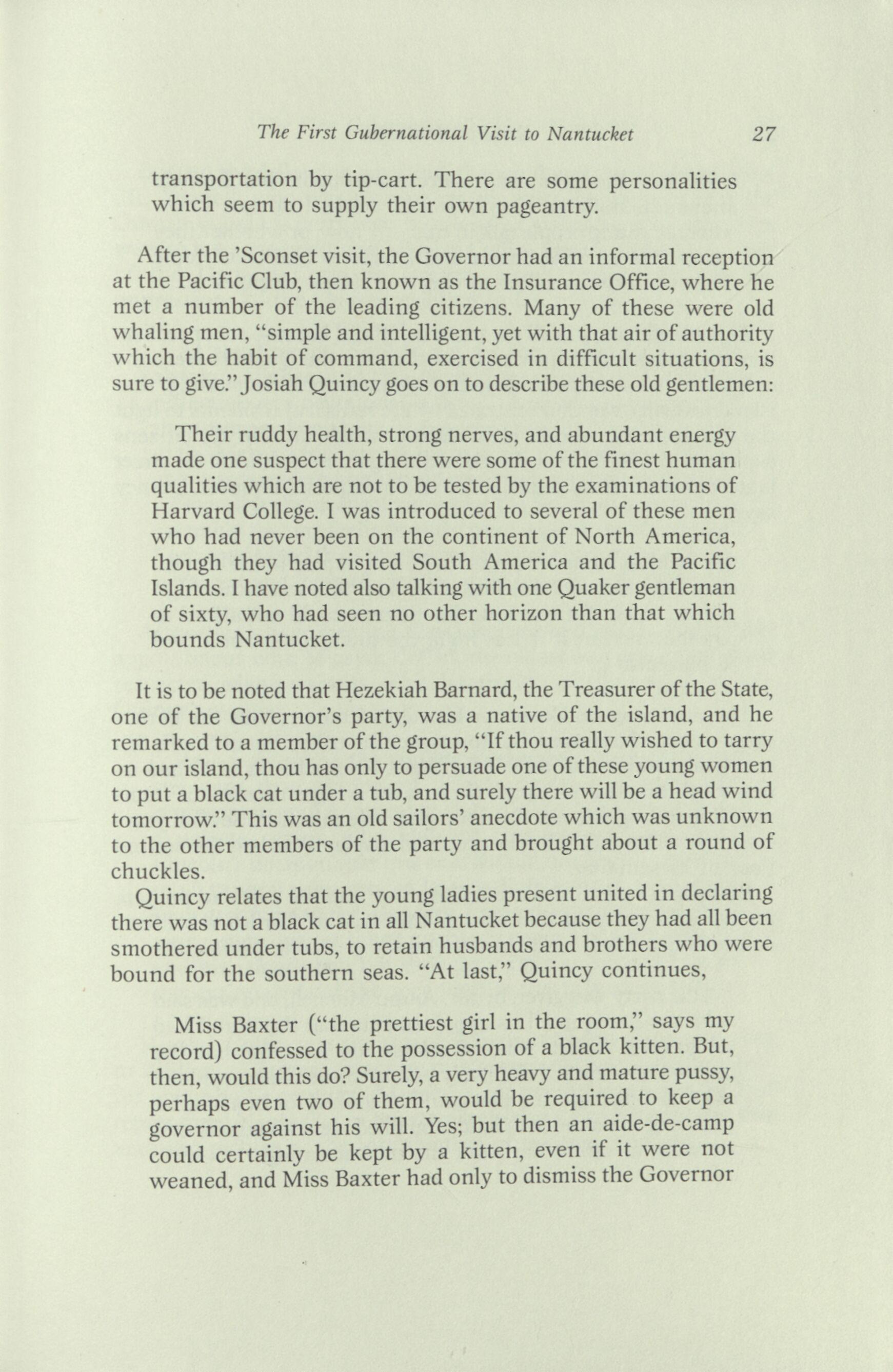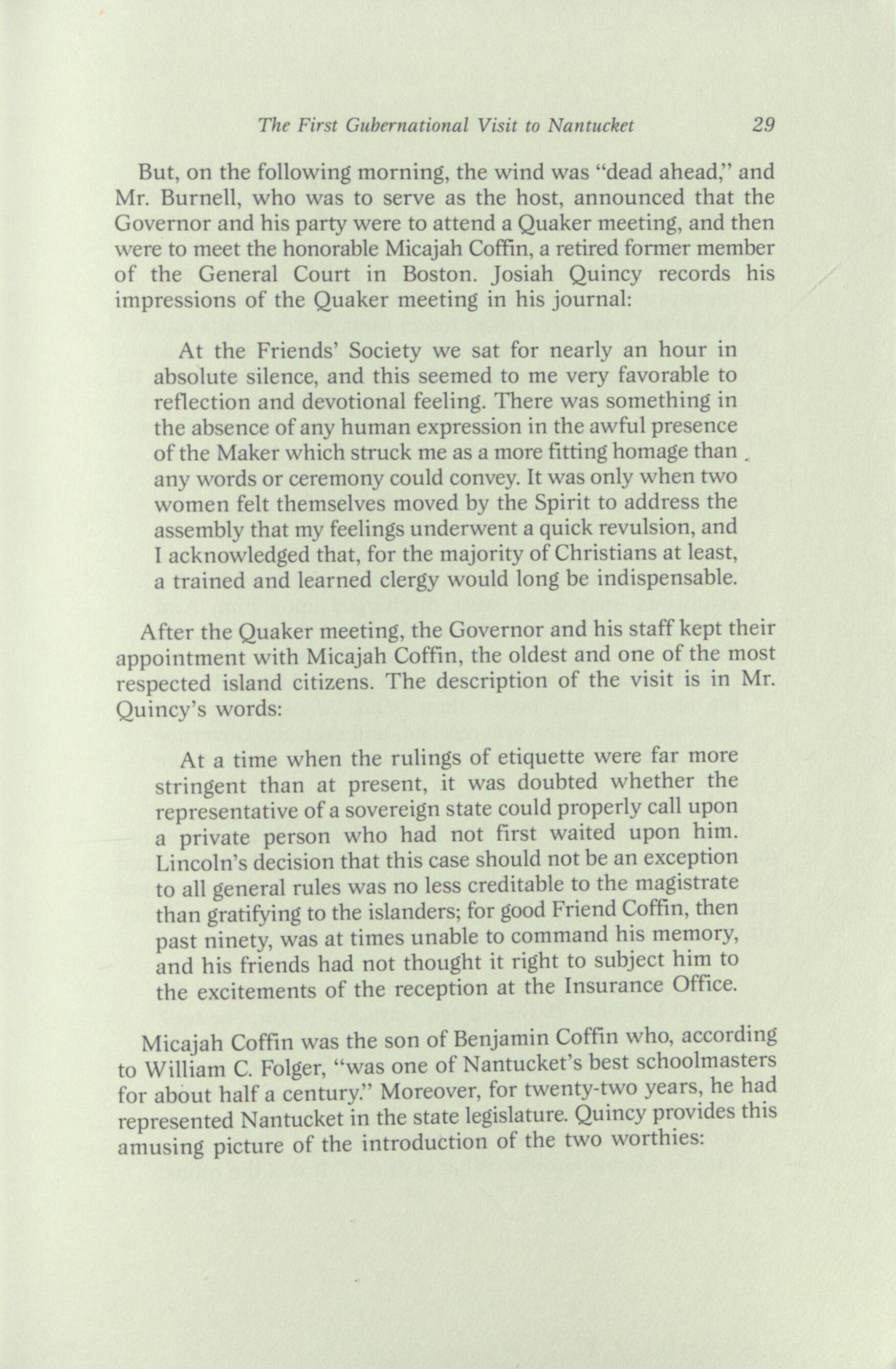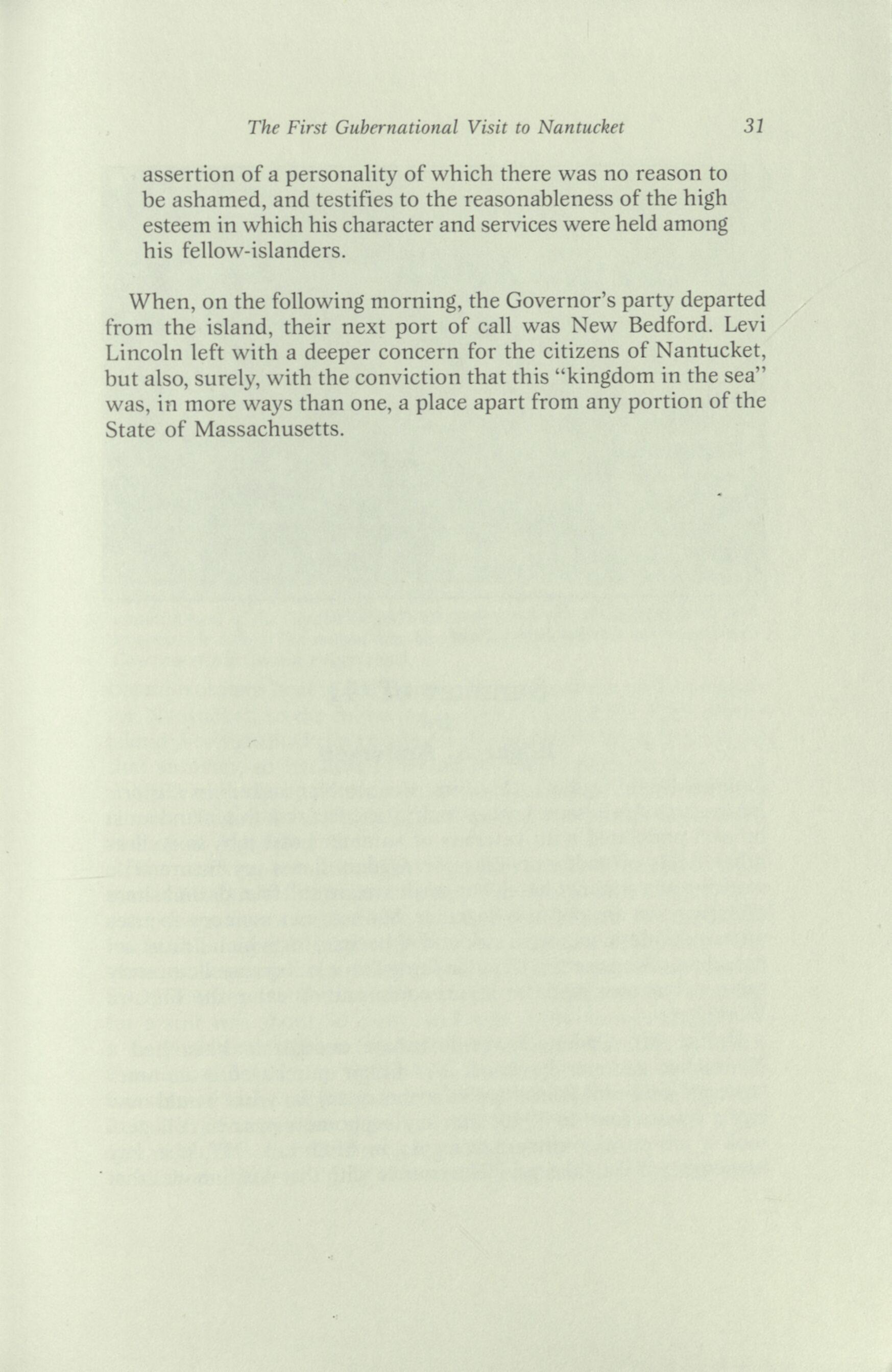
10 minute read
The First Gubernational Visit to Nantucket
The First Gubernational Visit to Nantucket
27
transportation by tip-cart. There are some personalities which seem to supply their own pageantry.
After the 'Sconset visit, the Governor had an informal reception at the Pacific Club, then known as the Insurance Office, where he met a number of the leading citizens. Many of these were old whaling men, "simple and intelligent, yet with that air of authority which the habit of command, exercised in difficult situations, is sure to give." Josiah Quincy goes on to describe these old gentlemen:
Their ruddy health, strong nerves, and abundant energy made one suspect that there were some of the finest human qualities which are not to be tested by the examinations of Harvard College. I was introduced to several of these men who had never been on the continent of North America, though they had visited South America and the Pacific Islands. I have noted also talking with one Quaker gentleman of sixty, who had seen no other horizon than that which bounds Nantucket.
It is to be noted that Hezekiah Barnard, the Treasurer of the State, one of the Governor's party, was a native of the island, and he remarked to a member of the group, "If thou really wished to tarry on our island, thou has only to persuade one of these young women to put a black cat under a tub, and surely there will be a head wind tomorrow." This was an old sailors' anecdote which was unknown to the other members of the party and brought about a round of chuckles.
Quincy relates that the young ladies present united in declaring there was not a black cat in all Nantucket because they had all been smothered under tubs, to retain husbands and brothers who were bound for the southern seas. "At last," Quincy continues,
Miss Baxter ("the prettiest girl in the room," says my record) confessed to the possession of a black kitten. But, then, would this do? Surely, a very heavy and mature pussy, perhaps even two of them, would be required to keep a governor against his will. Yes; but then an aide-de-camp could certainly be kept by a kitten, even if it were not weaned, and Miss Baxter had only to dismiss the Governor
28
Historic Nantucket
from her thoughts and concentrate upon his humble attendant, and the charm would work. I do not know whether young people talk in this way now, or whether they are as glad as Miss Baxter and I were to find some topic other than the weather to ring our simple changes on...
This playful story is all the more delightful because sober realism was the dominant feature of a town where the Quakers were the oldest and most respectable group. Quincy notes, in passing, that island frugality was demonstrated by the refusal of residents to light the streets of the world's great mart of whale oil. Thrifty citizens explained to him that it would be extravagant to use-the oil for street lanterns when it was available for sale by export. Moreover, Quincy says,
the reckless innovator was invited to impale himself upon one of the horns of this little dilemma: "Oil was either high or low. Now, if it was low, the citizens could not afford to pay the tax; but if it was high, the town could not afford to purchase it."
The next stop on Governor Lincoln's itinerary was the barber shop -- not to be shaved, but to inspect the collection of South Sea curiosities which was on display there. Nantucket in 1825 had no historical museum although there were a large number of items available throughout the town for such an exhibition. Several years later, the Atheneum Library provided display space on the second floor of its building.
By now it was time for the Governor and his party to prepare for the gala party in their honor that was to furnish a brilliant conclusion to their visit. Josiah Quincy gives the particulars:

This party was given by Mr. Aaron Mitchell, and was said to be the finest in all its appointments that the island had yet known. There was, of course, no dancing; but the number of beautiful and lively young women impressed me as exceeding anything that could he looked for in a similar gathering upon the mainland, and filled me with regrets that we were to sail at daybreak the next morning.
The First Guhernational Visit to Nantucket 29
But, on the following morning, the wind was "dead ahead," and Mr. Burnell, who was to serve as the host, announced that the Governor and his party were to attend a Quaker meeting, and then were to meet the honorable Micajah Coffin, a retired former member of the General Court in Boston. Josiah Quincy records his impressions of the Quaker meeting in his journal:
At the Friends' Society we sat for nearly an hour in absolute silence, and this seemed to me very favorable to reflection and devotional feeling. There was something in the absence of any human expression in the awful presence of the Maker which struck me as a more fitting homage than . any words or ceremony could convey. It was only when two women felt themselves moved by the Spirit to address the assembly that my feelings underwent a quick revulsion, and I acknowledged that, for the majority of Christians at least, a trained and learned clergy would long be indispensable.
After the Quaker meeting, the Governor and his staff kept their appointment with Micajah Coffin, the oldest and one of the most respected island citizens. The description of the visit is in Mr. Quincy's words:

At a time when the rulings of etiquette were far more stringent than at present, it was doubted whether the representative of a sovereign state could properly call upon a private person who had not first waited upon him. Lincoln's decision that this case should not be an exception to all general rules was no less creditable to the magistrate than gratifying to the islanders; for good Friend Coffin, then past ninety, was at times unable to command his memory, and his friends had not thought it right to subject him to the excitements of the reception at the Insurance Office.
Micajah Coffin was the son of Benjamin Coffin who, according to William C. Folger, "was one of Nantucket's best schoolmasters for about half a century." Moreover, for twenty-two years, he had represented Nantucket in the state legislature. Quincy provides this amusing picture of the introduction of the two worthies.
30 Historic Nantucket
When this patriarch of Nantucket was presented to the Governor, it made so little impression upon him that he instantly forgot the presence of the chief magistrate; and yet a moment afterward he astonished us with one of those strange feats of memory which show with how tight a grip the mysterious nerve-centres, of which we hear so much, hold what has been committed to them. For having a dim consciousness that something out of the common was expected from him, the venerable man turned suddenly upon Postmaster Hill, and proceeded to harangue that very modest gentleman in a set Latin speech. It was one of those occurrences which might appear sad or droll to the bystanders, and I hope it does not reflect upon the good feelings of the party to mention that we found its comic aspect quite irresistible. There was poor Mr. Hill, overcome with mortification at being mistaken for the Governor, and shrinking from fine Latin superlatives, which, under this erroneous impression, were discharged upon him. And when the Postmaster, at the conclusion of the address, felt that he was bound in courtesy to make some response (which, of course, could not be in the vernacular), and could hit upon nothing better than "Owi, Monsieur, je vous remercie," the climax was reached, and even the Governor was forced to give audible expression to his sense of the ridiculous.

It was the custom of the old schoolteachers to bring Latin into the school as a spoken language, and Benjamin Coffin had instructed his son well. The observant Mr. Quincy has some further pertinent remarks about Micajah Coffin which he adds to the story, and they are of more than ordinary interest to Nantucket.
Micajah Coffin lived for little more than a year after the visit of Lincoln. "In his old age," says Mr. Folger, "he took an interest in visiting the sick and aiding them in procuring native plants suited to cure or at least to relieve their various maladies." I learn, also, that in his rambles about Nantucket, when he met a face that was unknown to him, he was accustomed to stop and give this challenge: "Friend, my name is Micajah Coffin. What is thine?" It was the robust
The First Guhernational Visit to Nantucket 31
assertion of a personality of which there was no reason to be ashamed, and testifies to the reasonableness of the high esteem in which his character and services were held among his fellow-islanders.
When, on the following morning, the Governor's party departed from the island, their next port of call was New Bedford. Levi Lincoln left with a deeper concern for the citizens of Nantucket, but also, surely, with the conviction that this "kingdom in the sea" was, in more ways than one, a place apart from any portion of the State of Massachusetts.

Post card view of the Gordon Folger Hotel, c. 1940. Courtesy of the Gordon Folger Hotel.
Summer of '41

by
Edgar A. Anderson
Reading David Ogden's "My First Visit to Nantucket" in Historic Nantucket's April issue, I was struck by the fact that this island must be well populated with veterans of summer hotel jobs as well as other fields of endeavor. Like Mr. Ogden, I met my future wife working at a summer hotel, but while we are still friends and share offspring, we are not now together. My summer memory focuses on one dramatic moment, suspended in time, for which I must set the scene. "Scene setting" is something I do a lot because I currently serve as business manager of our community theater, the Theatre Workshop.
Unlike Mr. Ogden, I was fortunate enough to have had a Nantucket summer boyhood. My father purchased a summer "cottage" on Brant Point (twelve rooms or so) for what would now buy a square foot. In 1940, after my sophomore year in college, I took a job on a country newspaper in Millbrook, NY, near my hometown of Poughkeepsie. The trouble with that position was that
33
Lobby of the Point Breeze Hotel, c. 1925. The Point Breeze was the predecessor establishment of the Gordon Folger, and the lobby is still immediately recognizable today. The spitoon has, however, been removed.
Courtesy of the Gordon Folger Hotel. the midsummer heat in the Hudson Valley made me very homesick for Nantucket, so the following summer, I opted for a job on the island. For reasons I can't quite recall, the family home was closed that summer, so I couldn't rely on that for a place to stay.
My friend, the late Steve Stone, was working as day clerk at the Gordon Folger Hotel and informed me that the post of night clerk was open. I grabbed it.
The working conditions for night clerk were $45 a month (or was it $40?) with room and board. The hours were 10 p.m. to 8 a.m., seven days a week. Since my hours prohibited any night life, I was able to put money aside and felt akin to a millionaire that summer. Let me point out that I could get shirts washed and pressed for 15 cents each at the laundry on Straight Wharf, and dry cleaning for a suit was about 50 cents, so I was really doing all right. 1 arrived each night at the desk, dressed in coat and tie, but shed these around 6 a.m. to light a coal fire in the kitchen range. The fire seemed to die out frequently, causing the chef to phone the desk to ask if I wanted raw eggs for breakfast. Finally, I bought a fan and, with this, got the fire going most of the time.
All during June and July, in a state of perpetual semi-exhaustion,




